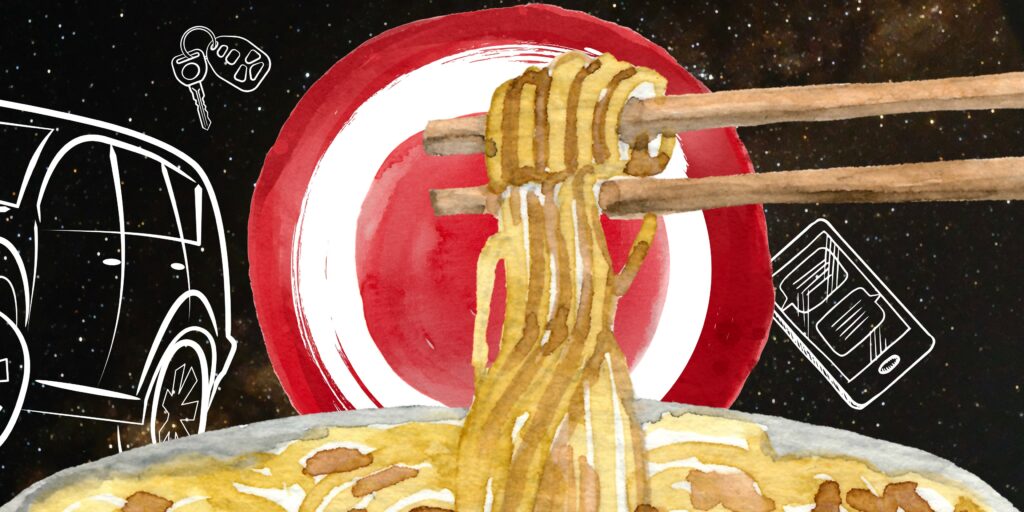She was a prisoner in this home, where death and decay had collected like a fog.

Sarojini’s mind was in several places at once: on the roof of Radiant Homes overlooking a sea of construction sites, inside its spanking new lobby where cleaning detergent singed the nostrils, next to the moustached landlord as he fanned sweat off his face with the agreement papers for the apartment. But Sarojini’s body was, unfortunately, in the ancestral home, which reeked of old age.
She sat in front of the muted television until 9 a.m. When the clock struck the hour, she dragged her chair to the phone, where she dialed her two sons who lived in America, the elder first as per custom. “I am ready to move,” she said to one and then the other, hanging up before either had the chance to speak. “I have found an apartment.”
She pulled the chair back in front of the television set and grabbed the plastic-covered remote, clicking past reeling news tickers and dancing lovers. The home watched in resentment, its ceiling a sky of gray clouds from the chronically leaking roof.
When the landlord at Radiant Homes had stated the price for the two bedroom/one hall/one balcony-facing-the-ocean apartment, 4,70,000 rupees, Sarojini had been shocked. Then she had reminded herself that she was not familiar with talks of such large money, and that if she were to take up residence in the best building in Udupi it was important to become accustomed to wealth. Sarojini had smiled pleasantly at the landlord and reassured him that she had sons in America, and that, yes, the money would come. “Wait,” she had said proudly. “They will be happy to help.”
She hadn’t been lying. At the time, she had been sure the brothers would give her the money, especially because she had agreed to their every whim.
Amma, have you declogged the drains before the monsoon rains? Amma, have the land contractors arrived to survey the building? Amma, have you brought in the cleaners to wipe the roof of debris, to sweep the driveway that must be filled with dirt with no car to fill it?
The brothers must have been very rich in America because each request was followed by a big, shiny sum deposited into her bank account, the biggest of which had come last year after their father had died: 2,00,000 rupees for a priest for death rites, for the wood for the burning pyre, for heaping spreads of food to feed the greedy community.
Sarojini reached the last of the television channels, where only the dregs of entertainment remained. The phone had not rang yet and Sarojini felt a slow doubt creep into her heart. She dragged the plastic chair across the room to the phone, where she waited for exactly twenty-two minutes, until it became so late that she could no longer put off her daily errands. But just as she stood up—brr—a shrill ring cut through the air.
Sarojini leapt up frantically, pushing the chair to the floor in her haste, jamming the phone against her ear. “Hello?” She waited to hear her eldest son’s familiar drawl. Instead, “Sarojini, Vasu here.”
Sarojini’s chest tightened with anger. “Yes Vasudev, what is it? Why at this hour?” Her brother did not usually call until noon, after he had spent at least a few morning hours ruminating over the topic of the next lecture he would spew upon her.
“Sarojini, your sons have called me.” Vasudev spoke slowly, his calmness more weapon than salve, pride in his voice at being able to deliver the news. “I worry for you. These obsessions with land, obsessions with novelty, no regard for our traditions and what our father has left behind,” he sighed. “This is not good. I have told the boys to say no.”
Sarojini slammed the phone lopsided back into the cradle. She felt her sadness bruise her throat.
She was a prisoner in this home, where death and decay had collected like a fog. She had decided that morning that she would not take the stench of the house for another moment, nor its jealous gaze, nor its constant moaning and creaking. And she had also decided that if the brothers did not return her call, that she would finally use the secret stash of money.
The first time that she had pocketed her sons’ money was a few years ago, when it had been sent to oil the squeaky gate. Through the phone, the brothers had heard the gate yawping to warn of the milkman’s arrival. The elder one proposed that they would send money to fix it, “we must take care of our inheritance, after all,” and the younger agreed immediately, “haan, haan.”
Sarojini found the duo foolish. They had not visited Udupi in years and sat like old women in their square American homes, spinning yarns about the deterioration that must have ravaged the home after they had left. Of course the gate squeaked. It kept watch over Sarojini—certainly, no one else did—and had learned the habit as defense after years of silently swinging open and shut to friends and intruders alike.
But Sarojini bit her tongue. When they sent the money over, she went to the bank, quiet as a thief. She felt that the teller must know about her illicit mission and almost wished that she had tied a bag around her head like a robber. She grabbed the wad of cash from the counter and hurried out of the bank, looking at no one.
The errands grew in whimsy and number, and Sarojini’s envelope of money grew as fat as a large rat. Sarojini had fired the maid and had stopped cleaning the slime from the well. The home’s beauty started to wane, its hooded windows casting a sad, ponderous gaze at anyone who dared to come near it.
And Sarojini moved the money from a rubber band wad in the kitchen behind the dinner plates, to a slightly bigger white envelope in the living room underneath the television set, to the biggest manila envelope she could find, which she stored in the steel cabinet in the bedroom.
She had spent so long collecting the money, counting the notes, pruning her lies for her sons. And now, she would reap the rewards.
The bedroom’s knob clattered loosely as she turned it. Inside the cabinet, under a stack of faded, soft nighties, Sarojini fished out the beloved key. She unlocked the topmost drawer, removing the manila envelope, its mouth stretched wide from stretching to fit new bills.
Sarojini held the thick wad of bills in her right hand and used her left to thumb through it. 4,20,000 rupees, 50,000 short. She counted again. The number remained the same. She closed her eyes, sent a quiet prayer into the air, and began to count once more, but her calculations were interrupted by the gate’s gentle squeak, as if it were being opened by someone who knew how to calm its clamorous mouth.
She hurried to jam the money back into the envelope, folding the very last bill inside when she heard the familiar tapping of a cane along the veranda. She peered around the cabinet door, her one eye scrutinizing the living room. In the window was a gray mop of unruly hair that undeniably belonged to Vasudev.
Sarojini felt her body freeze. A visit by Vasudev was far worse than his phone call sermons, which Sarojini handled by leaving the telephone face up and going about her day. In person, he demanded full attention and often grew violent, slamming his hand against walls and tables, once even gripping Sarojini’s arm so tight that he left behind crescent-mooned nail marks.
He had grown obsessed with Sarojini after his wife had died. In his solitude, he had become convinced of his own purity and believed that their father had granted him the responsibility of saving Sarojini before her inevitable death, before she was reborn as someone even more ravaged, even more tortured. There was a misalignment in her stars, he would often say, which is why she was such an unfortunate creature.
Sarojini knew that she was unfortunate. It had always been she who was left behind. Her two sons had enjoyed the home when it had been able to give, had played in its trees and eaten their sweet jamun fruit, had grown tall and had filled the home with their laughter, and had filled Sarojini’s melancholy with laughter, too.
But once they had grown old enough, they became men, and men were always strangers. The elder had spoken to her husband and found a way to escape to America, where there was abundant money, appropriate schooling, and many new homes, and within the year, the younger had followed suit. And they had never visited Udupi again, only called Sarojini to check that the home was being maintained so that they could sell it when the seaside town inevitably grew rich.
Without her sons, the home began to develop dark grooves in the corners that no one stepped foot in. Sarojini felt the darkness envelop her, too. Eventually, her husband also left, blessed with a bout of pneumonia that took him overnight, so that when Sarojini awoke at dawn for their prayers, she found his body clammy and cold. She often hoped that she would die, but the home would not even offer her that blessing, had kept her neither healthy nor sick, stuck like a squirming fruitfly to glue paper.
“Sarojini?” Vasudev’s voice cracked through the window. He tapped his cane impatiently against the tiles of the veranda. “Open up.”
“Vasudev?” Sarojini stuffed the envelope inside the open drawer. She padded her way into the living room. He stood by the window, his arm erect in an arrogant, expectant hello, his eyes dancing with anger. “I didn’t expect you,” she said. “One second.”
Sarojini placed her hand on the door, its once intricate carvings so faded that it looked like a piece of mangled wood. She mimicked twisting knobs, unhooking chains, pulling the door to dislodge it from its frame.
“Vasudev, it’s not opening,” she shouted out the window. “What? How could that be? Open up, now.” Vasudev pressed against the door with his body as Sarojini pretended to pull, the dull thump of his shoulder filling the room as it struck the wood, nearly shaking the door from its very frame.
Sarojini wondered if Vasudev would go home. She could not imagine him resorting to the side entrance, lifting up his lungi to enter from the bathroom door where the floor was still wet with the dirty water from her morning shower. The thumping slowed, then stopped. Sarojini stepped back towards the window, her shoulders sagging in relief.
“Maybe we can try later, Vasu,” she barely got out, but Vasudev had stepped away from the door, positioning himself as if he were a pebble at the tail end of a rubber band. With a sudden lurch, he shot through the door, like a mango falling heavy from a tree and rupturing a roof, like a fist ripping its way through paper, like one of those all powerful golden bullets sent from the heavens that only appeared in television movies. The old locks shattered and the wood splintered into useless fragments.
Vasudev moaned in pain on the floor, clutching his arm as he pushed himself up in a pitiful pose. He was afloat in a sea of broken wood pieces, his thin shirt covered in flakes of woodchip. His lungi remained intact, saving both of their shame, but his splayed legs revealed a deep gash down his hairy, sinewy thigh. Blood started to trickle from it. Another tributary started near his hairline.
“Vasu?” Sarojini ventured. Vasu closed his eyes, resting his head against the hot tiles. He would need to go to the hospital.
At 9:57 a.m., Sarojini returned once more to the phone, walking gingerly to avoid the splints of wood that had scattered about the floor. She picked up the chair and propped it back up next to the table, tucking the loose ends of her sari into her waistband as she sat down. The phone rang once, twice, thrice.
“Hello?”
“Vasu is dying,” she said. “Please send money. Urgent. 50,000 rupees will do.”



